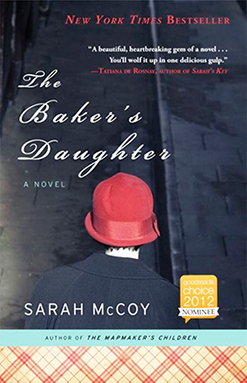 Michelle Newby is contributing editor at Lone Star Literary Life, reviewer for Foreword Reviews, freelance writer, member of the National Book Critics Circle, and blogger at www.TexasBookLover.com. Her reviews appear or are forthcoming in Pleiades Magazine, Rain Taxi, World Literature Today, South85 Journal, The Review Review, Concho River Review, Monkeybicycle, Mosaic Literary Magazine, Atticus Review, and The Collagist.
Michelle Newby is contributing editor at Lone Star Literary Life, reviewer for Foreword Reviews, freelance writer, member of the National Book Critics Circle, and blogger at www.TexasBookLover.com. Her reviews appear or are forthcoming in Pleiades Magazine, Rain Taxi, World Literature Today, South85 Journal, The Review Review, Concho River Review, Monkeybicycle, Mosaic Literary Magazine, Atticus Review, and The Collagist.
Lone Star Book Reviews
of Texas books appear weekly
at LoneStarLiterary.com
 Sarah McCoy is the New York Times, USA Today, and international bestselling author of The Mapmaker’s Children; The Baker’s Daughter, a 2012 Goodreads Choice Award Best Historical Fiction nominee; the novella “The Branch of Hazel” in Grand Central; and The Time It Snowed in Puerto Rico. Her work has been featured in Real Simple, The Millions, Your Health Monthly, Huffington Post and other publications. She has taught English writing at Old Dominion University and at the University of Texas at El Paso. She calls Virginia home but presently lives with her husband, an Army physician, and their dog, Gilly, in El Paso, Texas. Connect with Sarah on Twitter at @SarahMMcCoy, on her Facebook Fan Page, Goodreads, or via her website, www.sarahmccoy.com.
Sarah McCoy is the New York Times, USA Today, and international bestselling author of The Mapmaker’s Children; The Baker’s Daughter, a 2012 Goodreads Choice Award Best Historical Fiction nominee; the novella “The Branch of Hazel” in Grand Central; and The Time It Snowed in Puerto Rico. Her work has been featured in Real Simple, The Millions, Your Health Monthly, Huffington Post and other publications. She has taught English writing at Old Dominion University and at the University of Texas at El Paso. She calls Virginia home but presently lives with her husband, an Army physician, and their dog, Gilly, in El Paso, Texas. Connect with Sarah on Twitter at @SarahMMcCoy, on her Facebook Fan Page, Goodreads, or via her website, www.sarahmccoy.com.
For summer, we'll be reviewing several recent audiobook editions of Texas books. We hope you enjoy your reading—and driving, hiking, exercising, or whatever you're doing while you give these titles a listen!
Sarah McCoy
Read by Elisabeth Rodgers
Audible audio edition, 11 hours and 47 minutes, unabridged, $21.95
Also available in hardcover (2012), ebook and paperback (Broadway Books, 978-0-307-46019-6, 304 pgs. $13.95, August 2012)
The Baker’s Daughter by Sarah McCoy is an entertaining and illuminating exploration of the false dichotomy between loyalty to country and personal conviction. Moving backward and forward in time between World War II Germany and present-day El Paso, Texas, McCoy draws parallels between those who did what they could to help the Jews and those who do what they can to help Central American immigrants.
Reba is an El Paso journalist writing a feel-good piece on Christmas traditions around the world. She goes to a German bakery to interview the owners, Elsie, who married an American GI and left Germany for the United States sixty years earlier, and her daughter, Jane. Reba gets more story than she bargained for, and the experience proves transformative.
McCoy skillfully conjures the atmosphere of terror, paranoia, and desperation in Germany in early 1945. Advice from Elsie’s mother: “Don’t act like a gypsy or Jewess— unpredictable spirits….One cross word— that’s all it takes, Elsie.” As befits this novel, food imagery and metaphor abound. “Josef’s world of power, prestige, and uncensored euphoria...dripped off everyone and everything in the room, like fruit glaze on a strawberry tart.” McCoy uses the bounty at a Nazi party to convey the shiny exterior hiding the rotten core of the Reich. Dinner looks appetizing but when Elsie digs in, the pork is “so lardy she needn’t chew; the jelly rind slid down her throat; the potatoes were gray and mushy; the sausage mealy and under cooked.”
McCoy’s characters are complex and diverse. My only complaint is Jane’s grammar and mannerisms. She approaches caricature with her “don’t” for “doesn’t” and “feller” for — what? boyfriend? — and all that thigh-slapping. She refers to “the TV” like “the diabetes.” There are multiple subplots: Reba and her family, Reba and her boyfriend Riki (who is a Border Patrol agent), and one involving a Nazi officer. McCoy has pulled off a rare feat — each of these subplots is relevant and adds to the narrative.
Evenly paced, suspenseful approaching the denouement as the Americans and Russians take Germany, The Baker’s Daughter holds your attention. The plot is intricate and a joy to watch as the strands are flawlessly woven together. The ending is satisfying, if a bit sweet — happy endings all around. However, I like to think the sweet mitigates the ick factor of Nazi breeding cults.
Elisabeth Rodgers, an actress with extensive stage experience who has narrated more than 75 books, including an Audie Award winner and two Audible Earphones Award winners, reads The Baker’s Daughter smoothly and evenly, with a good ear for German accents. Though I found her men awkward, Rodgers’ women are distinctive and engaging, and she skillfully conveys age, personality, and atmosphere.
To whom or what do we owe allegiance? To an abstraction or to the flesh-and-blood human being in front of us? We must examine the distinctions without differences and arbitrary categories we create. As Riki considers, “at what point [does] human compassion trump blind obedience”?
* * * * *


